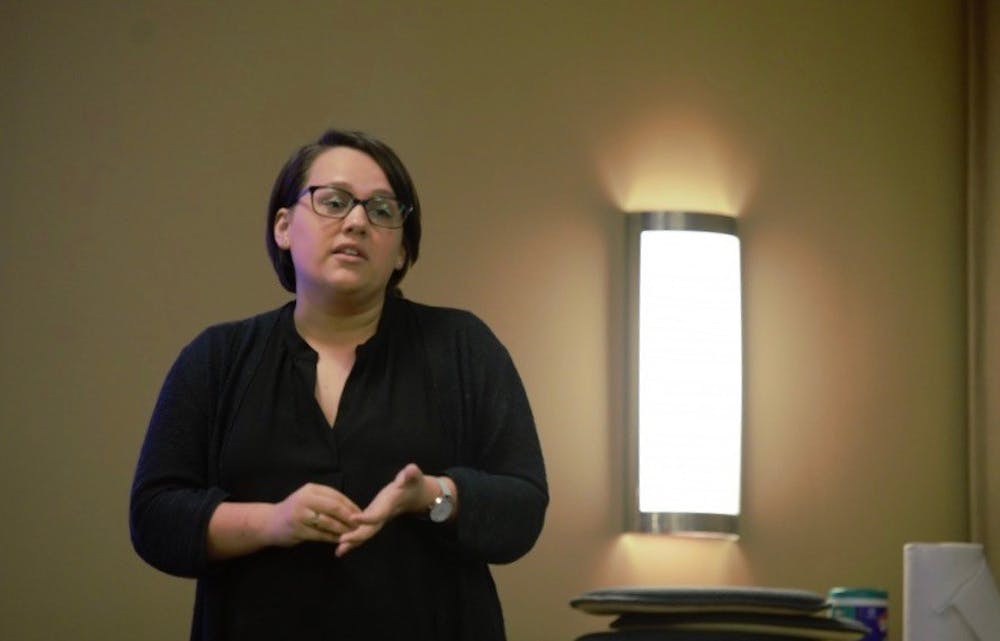The University Judiciary Committee gathered Sunday night to hear a presentation on its growing partnership with the Office of the Dean of Students and how UJC should work with accused students going forward.
Kevin Warshaw, a fourth-year Engineering student and UJC chair, introduced ODOS case manager Shelby Gibson, who assists the Deans in ODOS with administrative matters, such as preparing documentation for judiciary cases and meeting with students.
Gibson opened her presentation with an explanation of her role in ODOS and how the office consults with the UJC and offers advice.
“Support is obviously a big part of what we do,” Gibson said. “The other piece of our office is where our partnership with [UJC] comes in a little bit more formally is the conduct aspect. We have the ability to refer to [UJC] and Honor as far as the formal conduct process.”
ODOS — which is located in Peabody Hall — consists of a team of professional and support staff available to provide students with guidance and advice in times of crisis. Gibson said ODOS will often meet with students on issues of personal challenge, family difficulty, financial challenges and mental health and will refer students to various support resources available at the University.
When ODOS becomes aware that a student has engaged in violations of the University’s Standards of Conduct, they make a referral to UJC to investigate and try potential violations. The Standards of Conduct address behavior such as the damage of or unlawful entry onto University property, disorderly conduct on U.Va. property or the violation of state or federal laws.
“Most of these matters are alcohol related, whether that just be underrage possession, presenting a fake ID to an officer, or all the way up to a DUI,” Gibson said. “We make a lot of those referrals.”
Gibson added that ODOS handles every student-reported matter with high confidentiality. ODOS is, however, mandated to report out on Title IX related allegations, such as sexual assault, harassment or discrimination, and any sign that a student will harm themself or others.
During the presentation, Gibson advised UJC members how to support students who may be in distress or crisis when they learn UJC charges are being filed against them.
“Even if they know it is coming, even the process itself can be really stressful,” she said. “The experience of a lot of students that I’ve worked with, they are highly stressed out when it comes the UJC process, they don’t know what’s going to happen.”
The UJC was encouraged to support students by helping them find additional counseling services, talk them through their options of support if they are hesitant to meet with someone else and to always connect the students with UJC leadership or ODOS directly for further concerns.
“If a student indicates during the process that they are just extremely overwhelmed, they’re so anxious or just highly stressed out, all of you are in these roles because you’ve been trusted to work with our students and work with our community in this way,” Gibson told the Committee. “You just want to be aware of those times where it seems like it’s really crossed a line for them.”
ODOS will also consult with UJC on students who have been accused of a Standards of Conduct violation, but will not discuss the UJC process with students, comment on the details of the case against the student or connect with the student without telling UJC first.
“We’re going to talk with [UJC] about the process in terms of our decision making so if there is something that stands out with us that is concerning, we’ll check with [UJC] first,” Gibson said. “We want this to continue to be an open and trusting partnership.”
Jordan Arnold, a fourth-year College student and UJC vice chair for sanctions, told support officers — UJC members who help investigate cases and advise accused students and reporters — after the presentation to always be in communication with the trial chair if they think the student will be emotional or upset during the trial so they can take steps to mediate their issues.
“I had a trial once and a student was trying to give a testimony, and they were crying too hard to speak,” Arnold said. “So, you recess. If you’re thinking about objections as a counselor, that can also make a trial more stressful, so think carefully about these things.”
The UJC has tried to ensure that the trial process is fair and does not cause too much stress to a student, but emotions can sometimes play a factor in trials.
“I think when you see a student who is very emotional when discussing a case, it does sort of get a little more validity that they are taking it seriously, so I do think that it shows proper reflection,” Warshaw said. “It doesn’t necessarily mean that it’s going to be a lighter sanction but it is something that happens.”







